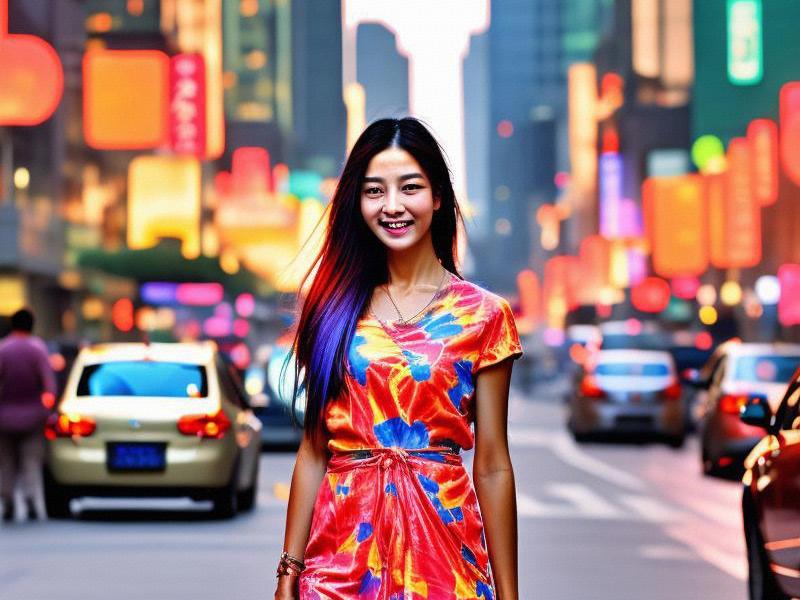
Shanghai, a city that has long been a beacon of modernity and progress in China, has recently been the epicenter of a rather scandalous yet fascinating social phenomenon: the beauty contest. These contests, with their glitzy stages and glamorous contestants, have become a hot topic of discussion, not just for their aesthetic appeal but also for the insights they provide into the city's social fabric and cultural evolution.
The beauty contest phenomenon in Shanghai is not new. It has been a staple of the city's social calendar for decades, attracting participants from all walks of life and spectators from all corners of the globe. However, in recent years, these contests have taken on a new dimension, becoming a platform for social commentary and cultural critique.
At the heart of these beauty contests are the glamorous ladies who take to the stage, vying for the coveted title. These women, often young and beautiful, are the epitome of the modern Shanghai woman. They are confident, articulate, and unafraid to showcase their talents and beauty. But behind the glitz and glamour, there lies a complex web of social dynamics and cultural expectations.
One of the most fascinating aspects of Shanghai's beauty contests is the way they reflect the city's evolving beauty standards. In the past, beauty was often associated with traditional Chinese features such as a small nose, almond-shaped eyes, and fair skin. However, in recent years, there has been a shift towards a more globalized standard of beauty, with Western features such as high cheekbones, full lips, and a curvaceous figure becoming increasingly desirable.
爱上海419论坛 This shift in beauty standards has been driven by a number of factors, including the influence of Western media and the growing popularity of plastic surgery. In Shanghai, a city that prides itself on being at the forefront of fashion and trends, plastic surgery has become increasingly accessible and socially acceptable. Many young women view it as a way to enhance their natural beauty and increase their chances of success in the highly competitive job market.
However, this trend towards a more globalized standard of beauty has not been without its controversies. Critics argue that it promotes a narrow and unattainable ideal of beauty, leading to body image issues and low self-esteem among young women. They also point out that it reinforces harmful stereotypes and discriminates against those who do not fit the desired mold.
Despite these criticisms, the beauty contest phenomenon in Shanghai continues to thrive, attracting a large and diverse audience. These contests have become a platform for social commentary and cultural critique, with contestants using their platforms to challenge societal norms and advocate for change.
One such contestant is Lily, a 24-year-old law student who participated in last year's Miss Shanghai pageant. Lily, who describes herself as "a regular girl from a small town," says she entered the contest to prove that you don't have to be a size zero or have undergone plastic surgery to be beautiful. "I wanted to show that there is more to beauty than just looks," she says. "It's about confidence, intelligence, and character."
上海龙凤论坛爱宝贝419 Lily's story is a testament to the changing dynamics of Shanghai's beauty contests. In the past, contestants were often chosen for their physical appearance alone. However, in recent years, there has been a greater emphasis on their personalities, talents, and social awareness. This shift reflects a broader cultural trend in Shanghai, where traditional values are being challenged by modern ideals of individuality and self-expression.
Another fascinating aspect of Shanghai's beauty contests is the way they highlight the city's social dynamics. These contests attract participants from all walks of life, including students, professionals, and entrepreneurs. They provide a platform for these individuals to showcase their talents and network with like-minded people, often leading to new opportunities and career advancements.
However, the beauty contest phenomenon is not without its controversies. Critics argue that it perpetuates a culture of superficiality and materialism, where beauty is valued above all else. They also point out that it reinforces harmful stereotypes and discriminates against those who do not fit the desired mold.
上海品茶网 Despite these criticisms, the beauty contest phenomenon in Shanghai continues to thrive, attracting a large and diverse audience. These contests have become a platform for social commentary and cultural critique, with contestants using their platforms to challenge societal norms and advocate for change.
One such example is the annual Miss Shanghai Gay pageant, which celebrates the city's LGBTQ+ community. This pageant, which has been held annually since 2016, provides a platform for LGBTQ+ individuals to showcase their talents and raise awareness about issues affecting their community. It also challenges societal norms and promotes acceptance and inclusivity.
The Miss Shanghai Gay pageant is a testament to the changing dynamics of Shanghai's beauty contests. In the past, these contests were often criticized for their lack of diversity and inclusivity. However, in recent years, there has been a greater emphasis on representing different backgrounds, identities, and perspectives.
This shift reflects a broader cultural trend in Shanghai, where traditional values are being challenged by modern ideals of diversity and inclusivity. It also highlights the city's commitment to promoting social harmony and equality, as well as its recognition of the importance of LGBTQ+ rights.
In conclusion, Shanghai's beauty contests offer a fascinating glimpse into the city's social dynamics, cultural evolution, and evolving beauty standards. While they have their controversies, they also provide a platform for social commentary and cultural critique, challenging societal norms and advocating for change. As Shanghai continues to grow and evolve, these contests will undoubtedly remain a significant part of the city's social calendar, reflecting its dynamic and ever-changing character.
